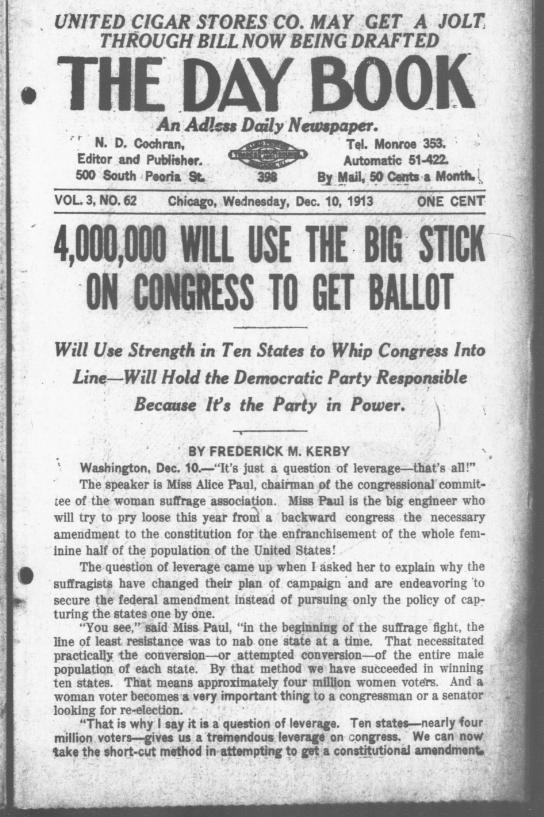|
Moderated by NW Okie! |
Volume 14 , Issue 112012Weekly eZine: (371 subscribers)Subscribe | Unsubscribe Using Desktop... |
4-Million Use Big Stick On Congress To Get Ballot

 According to The Day Book, Chicago, Illinois, Vol. 3, No. 62, Wednesday, 10 December 1913, we find the headlines, "4,000,000 Will Use the Big Stick On Congress To Get Ballot," as it was written by Frederick M. Kerby. It tells us in the report that the suffrage will use strength in ten states to whip congress into line, holding the Democratic party responsible because it was the party in power back then.
According to The Day Book, Chicago, Illinois, Vol. 3, No. 62, Wednesday, 10 December 1913, we find the headlines, "4,000,000 Will Use the Big Stick On Congress To Get Ballot," as it was written by Frederick M. Kerby. It tells us in the report that the suffrage will use strength in ten states to whip congress into line, holding the Democratic party responsible because it was the party in power back then.
Washington, Dec. 10, 1913 -- "It's just a question of leverage -- that's all!" The speaker, Miss Alice Paul, chairman of the congressional committee of the woman suffrage association said. Miss Paul was the big engineer who would try to pry loose in 1913 from a backward congress the necessary amendment to the constitution for the enfranchisement of the whole feminine half of the population of the United States?
A question of leverage came up when the newspaper reporter asked Alice Paul to explain why the suffragists had changed their plan of campaign and were endeavoring to secure the federal amendment instead of perusing only the policy of capturing the states one by one.
Miss Paul said, "You see in the beginning of the suffrage fight, the line of least resistance was to nab one state at a time. That necessitated practically the conversion, or attempted conversion, of the entire male population of each state. By that method we have succeeded in winning ten states. That means approximately four million women voters. And a woman voter becomes a very important thing to a congressman or a senator looking for re-election. That is why I say it is a question of leverage. Ten states, nearly four million voters, gives us a tremendous leverage on congress. We can now take the short-cut method in attempting to get a constitutional amendment. The sinning of ten states gives us the right, and the power, to call on one-fifth of the members of the senate and on one-seventh of the membership of congress; and these ten states represent one-sixth of the total electoral vote to be cast for president!"
"But that is not all," Miss Paul went on to state, "In addition to the states already won for suffrage, there are what we call 'The Campaign States.' I mean the seven states where the suffrage amendment has already passed the legislature and eventually will be submitted to the people in a referendum vote (Montana, Nevada, North Dakota, South Dakota, New York, Pennsylvania and New Jersey). Congressmen and senators from these states know that their people may adopt the suffrage amendment and consequently they are disposed to be on the safe side; at least they will not oppose us openly." Miss Alice Paul did not overlook any phase of the question, and pointed out the fact that a federal constitutional amendment needed to be adopted only once by a majority vote of a sufficient number of state legislatures.
In that same article, Miss Paul said, "In some states under the state method of securing the suffrage, the amendment must go through two successive state legislatures, as in Pennsylvania, New Jersey and New York. This would not be necessary in adopting a federal constitutional amendment. As long as the question must be submitted to each state legislature by either method, why not take the easiest way?"
The reporter asked Miss Paul, "What is to be the special effort of your congressional committee this winter.?"
Miss Paul replied, "The party in power is responsible. We are going to demand that the leaders of the Democratic party take some position with regard to woman suffrage. We have already sent three delegations to call on the president, one from the National Association, one from the National College Association and one from the National Council of Women Voters. The president told us that tariff and currency must be handled to the exclusion of other subjects. We shall continue to ask the president for his support. We shall ask the democratic leaders in congress for their support. We shall hold the party in power responsible."
The reporter then asked, "Will you oppose the re-election of congressmen and senators who are opposed to suffrage?"
Miss Paul said, "We will oppose the candidates of the Democratic party -- whether they oppose or favor suffrage. We must hold the party in power responsible. If that party will not grant us suffrage, then we must oppose that party at the polls!"
| View or Add Comments (0 Comments)
| Receive
updates ( subscribers) |
Unsubscribe
| © . Linda Mcgill Wagner - began © 1999 Contact Me | |
